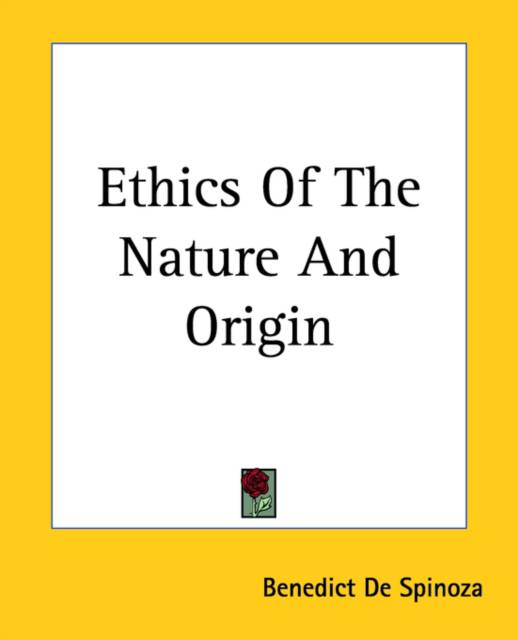
- Retrait gratuit dans votre magasin Club
- 7.000.000 titres dans notre catalogue
- Payer en toute sécurité
- Toujours un magasin près de chez vous
- Retrait gratuit dans votre magasin Club
- 7.000.0000 titres dans notre catalogue
- Payer en toute sécurité
- Toujours un magasin près de chez vous
Description
""The Ethics of the Nature and Origin"" is a philosophical work by Benedict de Spinoza, a Dutch philosopher from the 17th century. The book is divided into five parts, each of which explores different aspects of Spinoza's philosophy. In the first part, Spinoza discusses his views on God and nature, arguing that they are one and the same. He believes that everything in the universe is interconnected and that there is no distinction between the natural and the supernatural.The second part of the book explores Spinoza's views on the human mind and body. He argues that the mind and body are not separate entities but are instead two aspects of the same thing. He also discusses the nature of emotions and how they can be controlled.The third part of the book focuses on Spinoza's ethical theory. He argues that the ultimate goal of human existence is to achieve happiness, which he defines as the intellectual love of God. He also discusses the nature of good and evil and how they relate to human actions.The fourth part of the book explores Spinoza's political philosophy. He argues that the state should be based on reason rather than religion or tradition. He also discusses the nature of democracy and the role of the individual in society.Finally, the fifth part of the book discusses Spinoza's views on the nature of knowledge and truth. He argues that true knowledge can only be obtained through reason and that all other forms of knowledge are based on superstition and ignorance.Overall, ""The Ethics of the Nature and Origin"" is a comprehensive exploration of Spinoza's philosophy, covering a wide range of topics from God and nature to ethics and politics. It is a seminal work in the history of philosophy and continues to be studied and debated by scholars today.Modes of thinking, such as love, desire, or any other of the passions, do not take place, unless there be in the same individual an idea of the thing loved, desired, But the idea can exist without the presence of any other mode of thinking.This scarce antiquarian book is a facsimile reprint of the old original and may contain some imperfections such as library marks and notations. Because we believe this work is culturally important, we have made it available as part of our commitment for protecting, preserving, and promoting the world's literature in affordable, high quality, modern editions, that are true to their original work.
Spécifications
Parties prenantes
- Auteur(s) :
- Editeur:
Contenu
- Nombre de pages :
- 48
- Langue:
- Anglais
Caractéristiques
- EAN:
- 9781419118531
- Date de parution :
- 17-06-04
- Format:
- Livre broché
- Format numérique:
- Trade paperback (VS)
- Dimensions :
- 190 mm x 235 mm
- Poids :
- 99 g

Les avis
Nous publions uniquement les avis qui respectent les conditions requises. Consultez nos conditions pour les avis.






